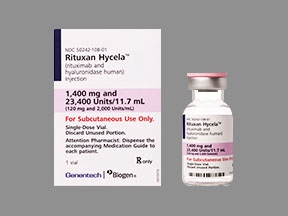
Rituxan Hycela Coupons & Savings Card – Discount Prices from $6794.53
My prescription
Edit
11.7ML of 1400-23400 MG-UT/11.7ML, Rituxan Hycela (1 Vial)
Select pharmacy

Albertsons
$6794.53
COUPON PRICE
Walgreens
$6818.49
COUPON PRICE
Walmart
$6833.99
COUPON PRICERituxan Hycela savings card
Show this card to your pharmacist
Albertsons
$6794.53
BIN
ID
PCN
GRP
019876
LH82F4D092
CHIPPO
LHX
Powered by
More prescriptions for leukemia
More prescriptions for leukemia
Price history for Rituxan Hycela
1 Vial, 11.7ML of 1400-23400 MG-UT/11.7ML
Average retail price for Rituxan Hycela
Average SaveHealth price for Rituxan Hycela
Our price history data is based on aggregated prescription data collected from participating pharmacies in America. Our prescription data updates daily to reflect the latest price changes. If you notice a missing data point, it means there wasn't sufficient data available to generate a monetary value for that date.
*Retail prices are based on pharmacy claims data, and may not be accurate when we don't have enough claims.
Rituxan Hycela dosage forms
Dosage Quantity Price from Per unit 11.7ML of 1400-23400 MG-UT/11.7ML 1 Vial $6794.53 $6794.53 11.7ML of 1400-23400 MG-UT/11.7ML 2 Vials $13581.57 $6790.78 11.7ML of 1400-23400 MG-UT/11.7ML 3 Vials $20368.60 $6789.53 13.4ML of 1600-26800 MG-UT/13.4ML 1 Vial $7764.11 $7764.11 13.4ML of 1600-26800 MG-UT/13.4ML 2 Vials $15520.71 $7760.35 13.4ML of 1600-26800 MG-UT/13.4ML 3 Vials $23277.32 $7759.11
| Dosage | Quantity | Price from | Per unit |
|---|---|---|---|
| 11.7ML of 1400-23400 MG-UT/11.7ML | 1 Vial | $6794.53 | $6794.53 |
| 11.7ML of 1400-23400 MG-UT/11.7ML | 2 Vials | $13581.57 | $6790.78 |
| 11.7ML of 1400-23400 MG-UT/11.7ML | 3 Vials | $20368.60 | $6789.53 |
| 13.4ML of 1600-26800 MG-UT/13.4ML | 1 Vial | $7764.11 | $7764.11 |
| 13.4ML of 1600-26800 MG-UT/13.4ML | 2 Vials | $15520.71 | $7760.35 |
| 13.4ML of 1600-26800 MG-UT/13.4ML | 3 Vials | $23277.32 | $7759.11 |
What is the drug RITUXAN HYCELA used for?
Rituxan Hycela is used for the treatment of certain types of blood cancers, including non-Hodgkin's lymphoma and chronic lymphocytic leukemia. It is also used for some autoimmune conditions, such as rheumatoid arthritis.
What is the difference between RITUXAN and RITUXAN HYCELA?
RITUXAN and RITUXAN HYCELA both contain rituximab, but they differ in their formulation and administration. RITUXAN is administered intravenously, while RITUXAN HYCELA is a subcutaneous injection that combines rituximab with hyaluronidase, an enzyme that helps with absorption under the skin. This allows RITUXAN HYCELA to be administered more quickly compared to the intravenous infusion of RITUXAN.
How much does RITUXAN HYCELA cost?
The cost of RITUXAN HYCELA can vary based on factors such as location, insurance coverage, and the healthcare provider. It is recommended to contact a pharmacy or healthcare provider directly for the most accurate and up-to-date pricing information. Additionally, insurance plans may cover part of the cost, so checking with the insurance provider is advisable.
What is the generic name for Rituxan Hycela?
The generic name for Rituxan Hycela is rituximab and hyaluronidase human.
Is RITUXAN HYCELA chemotherapy?
Rituxan Hycela is not classified as chemotherapy. It is a combination of rituximab, a monoclonal antibody, and hyaluronidase, an enzyme that helps with absorption. Rituximab targets specific proteins on the surface of certain cancer cells and is used in the treatment of certain types of blood cancers and autoimmune diseases.
